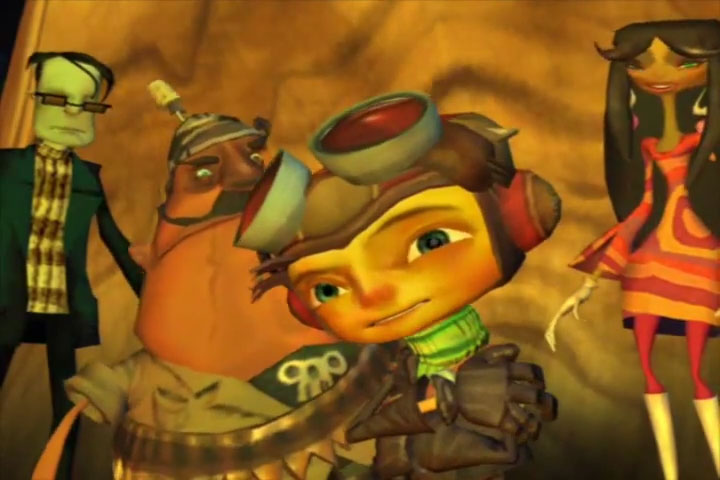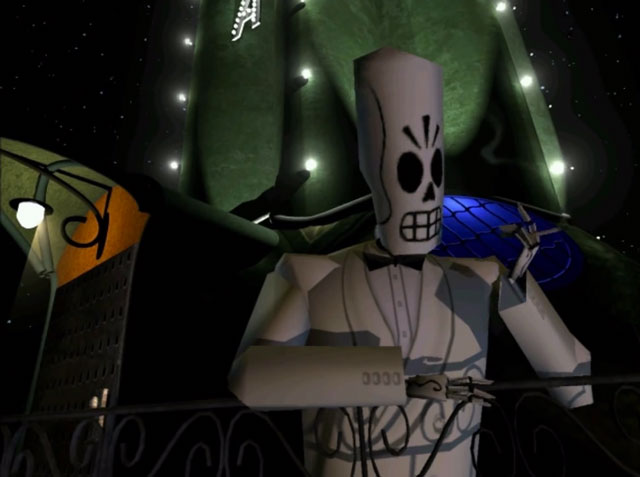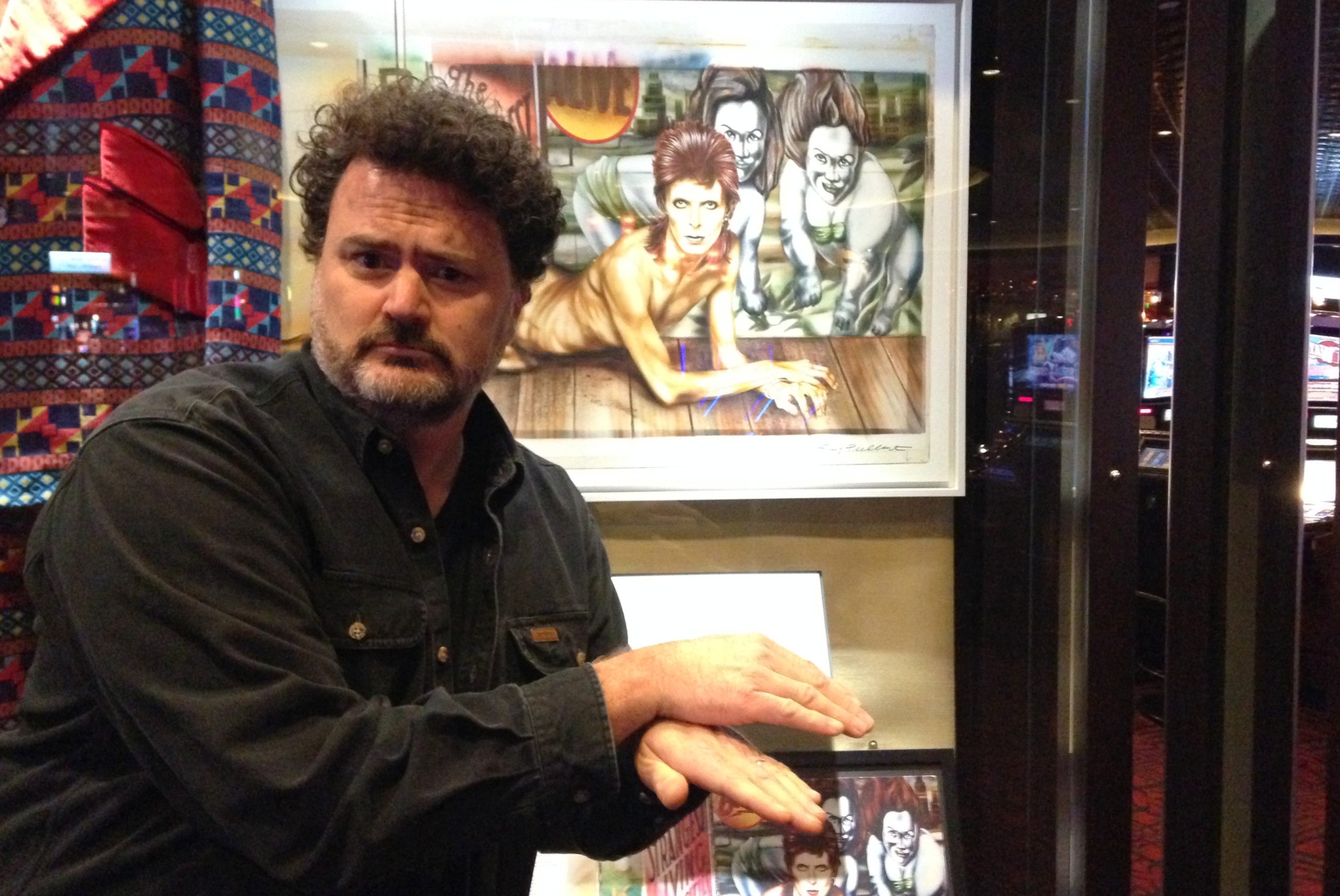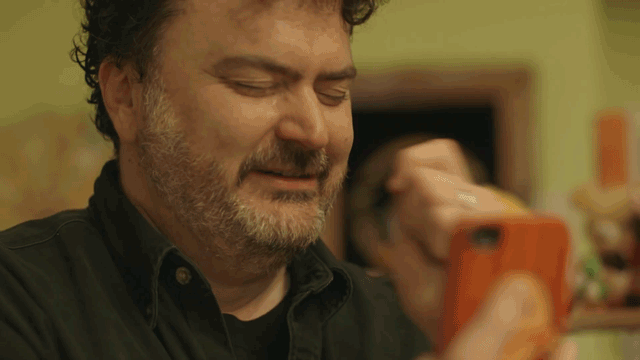A couple of weeks ago, I sat down with one of video gaming’s most creative people to talk about… money. Money. Business. And how things are so different and so much better in this, Tim Schafer’s 25th year making video games.
We were at DICE, a gaming convention in Las Vegas. It’s really more of a “summit”. They actually call it that. DICE happens in a big hotel on the Strip, though it’s a relatively small affair. It attracts just a few hundred attendees, not thousands, like the ostensibly similar Game Developers Conference.
Heads of game studios go to it. So do publishing executives. This is where the head of Gearbox plays poker with one of ex-heads of BioWare, where a Ubisoft studio chief or the inventor of the Oculus Rift will give a talk about whichever important part of the game industry they run. Go into the lounge and you’ll see Warren Spector is hanging out over in the corner.
“When I used to come to a show like this, I’d be like, ‘OK, I’ve got to network, I’ve got to meet people, I’ve got to shake hands,” Schafer told me when we took a seat in a quieter part of this year’s venue, the Hard Rock Hotel & Casino. “I felt like I had to do that for my survival.’”
Schafer: “When I used to come to shows like this, I’d be like, ‘Ok, I’ve got to network, I’ve got to meet people… I felt like I had to do that for my survival.”
A guy sits down at your lunch table and starts talking about the summit. It turns out he runs a massive middleware company.
The head of PlayStation worldwide studios chats with folks not that many feet from where the Microsoft people are having their own conversations. Off in hotel suites, developers show publishers games. At this year’s DICE, one tired developer I ran into said he’d run his demo through more than 30 times in two days.
Then the Kickstarter happened — the one Schafer launched after he landed in Las Vegas for DICE two years ago, the one where he asked for $US400,000 to make a traditional adventure game like he’d been making for decades and people gave him $US3.3 million instead.
Something else important happened recently, too: Double Fine stopped relying on game publishers and switched to publishing its own latest, biggest games.
“Now I come here and I’m just enjoying seeing my friends from the industry and talking about deals and stuff, but it’s not like — because we have multiple projects — it’s not like we have to sign a game in the next three months or we’re going to die.”
That’s good news, everyone.
That’s good news that a studio that so many people root for sounds like it’s no longer on the brink.
For a long time Tim Schafer’s storyline was this: creative guy, made cool adventure games such as The Secret of Monkey Island, Grim Fandango and Full Throttle with talented colleagues at LucasArts, started his own studio called Double Fine, made the beloved Psychonauts, the less beloved Brutal Legend and just sort of hung on since those games just didn’t sell.
Double Fine did what so many independent studios had done, especially on consoles and even on PC. They went to the EAs and the Activisions, the Microsofts, the THQs and so on. They went to publishers to get financing for their games. This was the process. It sounds fine in theory, miserable in practice. Schafer walked me through it:
“The old model is you pitch a game, you try to get as much money for it as you can for development. You set aside some money in that budget for the time in between.
“You either go late or it takes longer than that to sign your next game. And so you use up all that money. And then you’re back to zero.
“You have to take the next publishing deal that you can get. And they’re like, ‘Well, it’s got really terrible terms,’ and we’re like, ‘We’ll take it, we’ll take it,’ just to stay in business. We don’t want to miss payroll. So we take it — and that one is the bad deal, which has terrible recoup terms — and [they] take our [intellectual property] or something. But, at the end of it, we’re back to zero again.

“You never really go anywhere unless you have a huge, huge breakout hit, which is very unusual, and you can’t really bank on that happening. It was like an aeroplane flight where you would have long periods of smooth sailing and then absolute terror at the beginning and end, and we were like, ‘Oh my god how are we going to sign our next game?’”
Not that I missed the value of what he was saying, but I had to interrupt. I had to ask Schafer if he was afraid of flying or something. What kind of flights was he flying that were this terrifying?
He laughed. “That’s what they say it’s like for pilots: a whole lot of stress at the beginning and end and a whole lot of boredom in between.”
Not that making games is boredom. But, yeah, I got his drift.
I told Schafer what I thought his storyline was. I told him that Brutal Legend and Psychonauts didn’t seem like the successes they needed to keep running and that the Kickstarter that birthed the just-released Broken Age saved them.
“The Kickstarter was obviously a huge new way of doing things, but the biggest change was going into self-publishing where all those games you were saying didn’t do well, they actually sold fine for someone who was doing self-publishing,” he said. “So now that we have the publishing rights for those games back, they make us a lot of money that we used to invest back into Broken Age.”
The sales of Brutal Legend, formerly published by Activision EA but now published by Double Fine, helped pay for more Broken Age, Schafer told me.
Schafer: “We made more money off Psychonauts in the last two years than we ever did before — mostly because we didn’t have the publishing rights.”
“Psychonauts has been out so long and developed such a cult following that every time there’s a Steam sale it’s generating a bunch of money for us,” he said. “The scale of those sales makes the most sense for a company of our size. It might not be a blip on the radar for a company like Microsoft or EA or a huge company like that, but, for us, it allows us to make a thriving business off of creative ideas and inspiration-driven development.”
He checks in on the sales of his studio’s older games from time to time. “We made more money off of Psychonauts in the last two years than we ever did before — mostly because we didn’t have the publishing rights.”
Self-publishing is great and all, but Double Fine can’t publish all of the best games Schafer ever helped make. Disney still owns a bunch of them and has since the entertainment giant bought George Lucas’ media empire. That LucasArts library includes adventure game classics such as Grim Fandango and Full Throttle that were made by Schafer and friends. Schafer has been dreaming of getting control of those games long before Disney was involved but has yet to make any headway.
‘Since the day I left Lucas I’ve tried to get those rights back,” Schafer told me. The games are out of print and, like LucasArts before it, Disney doesn’t have any announced plans to bring them back.
Schafer: “If someone is going to do a nice version of Grim [Fandango], I think it should be us.”
“Large companies don’t like to let go of things even if they’re not using them, which is frustrating, but we try, because I would not like them to be in other people’s hands and I would like to do something with them or at least have them available.
“I would like to have them be available so people could buy them instead of pirate them if they wanted to. They don’t even have that option now. And I think if someone were going to do a nice version of it, it should be us. If someone was going to do a nice version of Grim [Fandango], I think it should be us.”

Schafer understandably didn’t want to tell me the exact status of any conversations he’s had with Disney about getting the rights to Grim Fandango and the like. “We want to do it and we have talked to them,” he said. “We’ve always talked to whoever had the rights and we’ll see. I’ll never give up. Someday someone will slip and accidentally give me…” He trailed off.
Double Fine can publish and has published Broken Age, or at least the first part of the adventure game they made with all that Kickstarter money. “It feels so good to ship Broken Age,” he said. Next up for him is finishing the game’s second part.
And then?
Double Fine’s Brad Muir is overseeing the studio’s other Kickstarted game, Massive Chalice. Teams at the studio are making Spacebase and Hack-and-Slash, two projects that came from an “Amnesia Fortnight” gamejam at the studio. Schafer and I had spoken on the eve of Double Fine’s next Amnesia Fortnight, this one a collaboration with Adventure Time creator Pendleton Ward, and he was expecting a surprise project or two to come out of that.
Schafer isn’t sure what game he’ll personally make after Broken Age. “I have ideas for games that are more systems-based,” he said, noting that Broken Age reminded him how much work goes into making each second of an adventure game that players can burn through. Games with systems — say, a battle system between story moments in a role-playing game — can make a game beefier and make it fun in a different way. Not that he’s making an RPG. He really has no idea, he told me. “We’ll always do something that has narrative and strong story to it.” That much is guaranteed.

In September of this year, Schafer will hit his 25th anniversary in game development. “I’ve gone through so many different phases,” he reflected. He made computer games. He made console games. He lived through movements toward more serious games — especially on PC — and through eras more focused on amusement.
“I’ve always been focused on coming up with original ideas and trying to get them made,” Schafer said as we wound down our conversation in Las Vegas and he got ready to catch up with more friends. “That really hasn’t changed at all.” Maybe lately, it’s gotten a little easier.

Comments
6 responses to “Tim Schafer Is Happier Now”
Aww, so no follow up adventure from Tim then :'(
Obligatory fanboy squeeeeeeee!
What’s happening with that game that was funded via kickstarter?
The one that was released last month? o_0
http://www.kotaku.com.au/2014/01/broken-age-act-1-the-kotaku-review/
Thanks. I thought the project kind of faded into nothing.
It’s good to see them in control of their own products and finances. I love Double Fine, but there’s no way they are ever going to make a game that sells 10 million units on the opening month. They make charming, elegant games, not blockbusters.
Honestly I’m surprised this man was turned down; with such an impressive line up of games and some would even say the pinnacle of their genre, so when he wants to make a game you can be as assured as you probably can in the industry that its going to be better than average game.
Especially if all he was asking for was 400k or there about, I’m mean really he would only need to sell 40k copies to break even with a $10 profit per sale(likely many times larger), yet with his pedigree and the ability to have it chucked on steam It likely would have well surpassed that 100 fold. To me as an investor It would have been easy money. So i’m glad despite all Kickstarter’s shortcomings and the projects within it, that it has allowed a good company to make great games and stay alive.